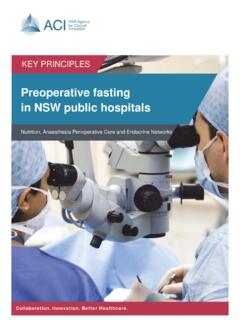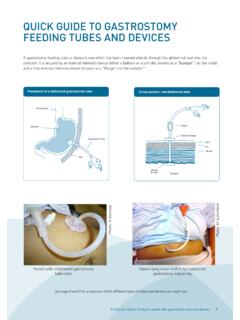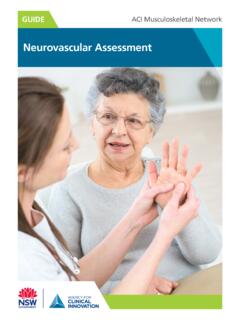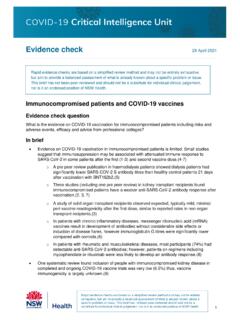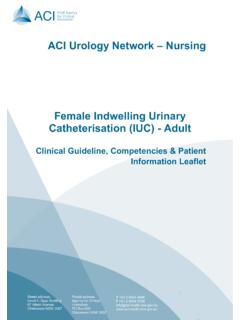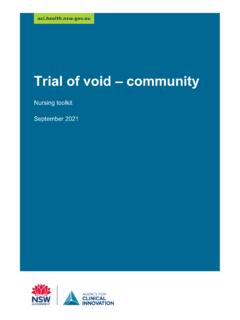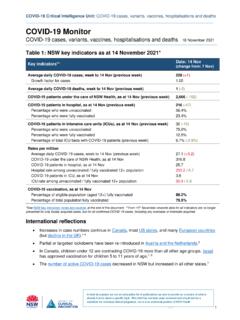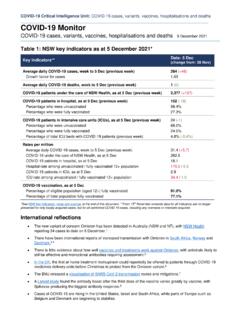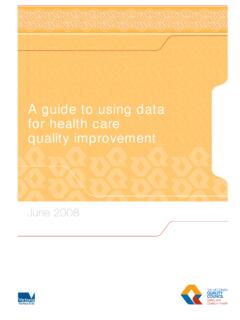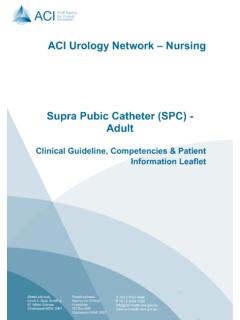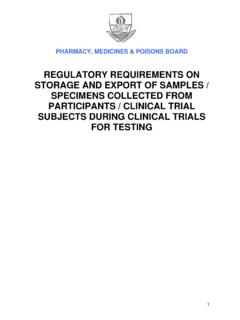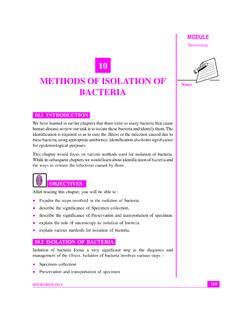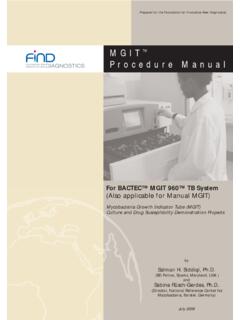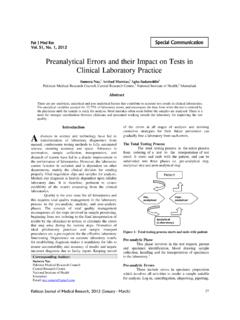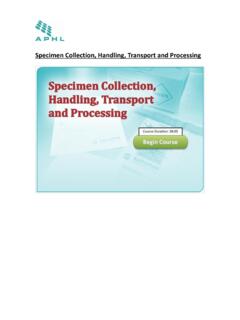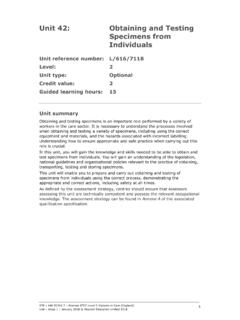Transcription of Collection of Urine Midstream - Guidelines
1 ACI UROLOGY NETWORK - NURSING. C O L L EC T IO N O F U RI N E. M I DS TR E A M. Guidelines . The following pages provide an example of clinical Guidelines to enable clinicians to develop their own resource material relevant to their hospital and Area Health Service. They have been compiled by clinicians for clinicians. If you wish to use this material please acknowledge those that have kindly provided their work to enable use by others. Revise all material with colleagues before using to ensure it is current and reflects best practice.. Disclaimer: The information contained herein is provided in good faith as a public service. The accuracy of any statements made is not guaranteed and it is the responsibility of readers to make their own enquiries as to the accuracy, currency and appropriateness of any information or advice provided. Liability for any act or omission occurring in reliance on this document or for any loss, damage or injury occurring as a consequence of such act or omission is expressly disclaimed.
2 With thanks to SESIAHS, Liverpool and Westmead Hospitals and the ACI Urology Nurses Working Party for 2. compiling this information. Sept 2008 Revised June 2012. Collection OF Urine . Midstream . Guidelines . CONTENTS. OPTIMAL OUTCOME .. 4. LIMITATIONS FOR PRACTICE .. 4. SPECIFIC 4. INFECTION 4. EQUIPMENT FOR NURSE COLLECTING .. 4. EQUIPMENT FOR PATIENT COLLECTING .. 4. METHOD .. 5. Nurse Collecting Sample .. 5. Patient collecting sample .. 5. DOCUMENTATION .. 6. Collection OF Urine specimen USING INTERMITTENT. 6. Clinical Indications: .. 6. Equipment: .. 6. Method: .. 6. EDUCATIONAL NOTES .. 7. With thanks to SESIAHS, Liverpool and Westmead Hospitals and the ACI Urology Nurses Working Party for 3. compiling this information Sept 2008. Revised June 2012. O P T I M A L O U TC O M E. A non contaminated clean catch mid stream Urine specimen is collected. L I M I TA T I O N S F O R P R A C T I C E.
3 Registered Nurse, Enrolled Nurse, Student Nurse EN or undergraduate under direct supervision SPECIFIC PRINCIPLES. Urine for microbiological analysis should be free of external contaminants Ambulatory patients, if cooperative and given adequate explanation, may obtain their own specimen I N F E C T I O N C O N T RO L. Standard precautions must be maintained EQUIPMENT FOR NURSE COLLECTING. Personal protective equipment - impervious gown, plastic apron, eye protection Pathology request form cotton balls/gauze squares 1 sachet sodium chloride Sterile kidney dish Sterile specimen container Biohazard specimen bag Bedpan or urinal Blue sheet Clinically clean disposable gloves Plastic bag for disposal of wastes E Q U I P M E N T F O R PA T I E N T C O L L E C T I N G. Gauze cloth moistened with normal saline Sterile specimen jar Pathology request form Biohazard specimen bag Plastic bag for disposal of waste With thanks to SESIAHS, Liverpool and Westmead Hospitals and the ACI Urology Nurses Working Party for 4.
4 Compiling this information. Sept 2008 Revised June 2012. METHOD. NURSE COLLECTING SAMPLE. Instruct the patient as follows: 1. Explain procedure to patient 2. Ensure patient privacy 3. Wash hands. 4. Don gloves 5. Sit patient on bedpan or position urinal 6. Separate labia or retract foreskin if present. Clean urethral meatus with sodium chloride soaked cotton wool balls or gauze in a downwards motion FRONT TO BACK. 7. Ask patient to pass first part of Urine stream into the toilet/bedpan/bottle 8. Catch Midstream specimen in sterile specimen container or sterile kidney dish. Take care not to contaminate the specimen . 9. Allow patient to void remainder of Urine . Ensure that the foreskin is reduced over glans 10. Ensure lid is tightened on container. Label specimen correctly with patient's name, medical record number and time and date of Collection . Note on the request form if the patient is menstruating.
5 11. Remove gloves 12. Wash hands 13. Place specimen container and request form in a biohazard specimen bag for transportation to the laboratory or store refrigerated for Collection . PATIENT COLLECTING SAMPLE. 1. Explain procedure to patient. 2. Ensure patient privacy 3. Advice patient to wash their hands pre-procedure 4. Ensure patient cleans urethral meatus with sodium chloride soaked cotton wool balls or gauze in a downwards motion FRONT TO BACK. 5. Instruct patient to collect Midstream specimen in sterile container after passing a small amount of Urine into the toilet/bedpan/bottle and then finish passing Urine into the toilet/bedpan/bottle 6. Retrieve specimen jar from patient and ensure lid is tightened on container. 7. Label specimen correctly with patient's name, medical record number and time and date of Collection . Note on the request form if the patient is menstruating.
6 8. Place specimen container and request form in a biohazard specimen bag for transportation to the laboratory or store refrigerated for 9. Wash hands With thanks to SESIAHS, Liverpool and Westmead Hospitals and the ACI Urology Nurses Working Party for 5. compiling this information Sept 2008. Revised June 2012. D O C U M E N TA T I O N. Care provided and specimen collected should be documented in the patients: Progress notes Nursing Care Plan/Unit Flow Chart Minimum statement should include time and reason specimen collected C O L L E C T I O N O F U R I N E S P E C I M E N U S I N G I N T E RM I T T E N T C A T H E T E R I S A T I O N. CLINICAL INDICATIONS: For a Urine specimen to be of value in determining whether an infection exists, they must be collected aseptically. In -out catheter specimens are generally used for patients who are incontinent or unable to manage the process of mid stream Urine Collection EQUIPMENT: Catheterisation set up Female or male CISC (Clean Intermittent Self Catheterising) catheter METHOD: Lie patient on bed removing clothing below the waist, cover with draw sheet (patient can change into a gown if they prefer).
7 Set up dressing trolley Wash hands Follow procedure of catheterisation as per facility policy Collect sterile specimen in kidney dish Remove catheter Transfer specimen to sterile jar Send to microbiology as per Catheter specimen of Urine . With thanks to SESIAHS, Liverpool and Westmead Hospitals and the ACI Urology Nurses Working Party for 6. compiling this information. Sept 2008 Revised June 2012. E D U C A T I O N A L N OT E S. The quality of the results obtained from examination of the Urine can only be as good as the quality of the specimen provided. The technique of the specimen Collection is therefore crucial'. To reduce the risk of contamination the Urine is collected as a mid stream specimen . the assumption being that potential contaminants are washed out of the urethra by the initial part of the stream' 1 Do not use an antiseptic for cleaning as even a small amount will contaminate the Urine and reduce the bacterial count1,2.
8 Paraphimosis can result from the foreskin not being reduced after the procedure. This can lead to constriction of the glans penis, resulting in pain, oedema and possible vascular compromise ..Paraphimosis is a urologic emergency that requires immediate dorsal slit or circumcision if the foreskin cannot be manually reduced' 3. Urinary tract infection (UTI) is defined as the presence of an infectious agent in any part of the urinary tract, excluding the urethra4. A UTI is an inflammation of the urinary tract secondary to an infectious agent. This is most commonly due to bacteria, a Urine culture colony count of 105 colony forming units (cfu)/mL is considered to be a significant bacteria'3. According to ICPMR Guidelines , specimens that are unacceptable for microbiological testing include: - Unlabelled or improperly labeled specimens (need at least 2 identifiers name and medical record number or name and date of birth).
9 - Unpreserved specimens received more than 12 hours after Collection - Specimens with obvious (visually apparent) contamination5. 1 Sussman,M (1990). Urinary Tract Infection: an overview. In Newall & R. Howell (Eds). Clinical urinalysis (pp 50-61). Buckinghamshire: Ames Division, Miles Ltd 2 Elley, K. & Semple, M (1999). Practical procedures for nurses 20:1: Collecting a mid stream specimen of Urine . Nursing Times, 95(2), insert 2p 3 Resnick, & Novak (Eds) . Urology Secrets (pp 205-207). Philadelphia: Hanley &. Belfus Inc. 4 Hough,R & Ul Haq, I. (1999). Internal Medicine. London: Mosby International 5 Centre for Infectious Diseases and Microbiology Laboratory Service (1999). specimen Collection Manual (3rd edition). Sydney: Institute of Clinical Pathology and Medical Research incorporating Western Sydney Area Health. With thanks to SESIAHS, Liverpool and Westmead Hospitals and the ACI Urology Nurses Working Party for 7.
10 Compiling this information Sept 2008. Revised June 2012.
